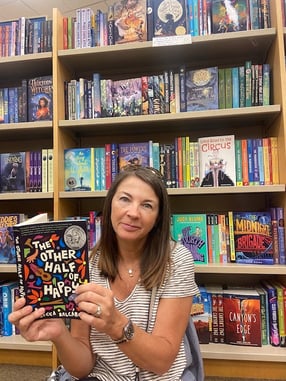The Other Half of Happy, by Rebecca Balcárcel, is a Pura Belpré Honor Award, a literary award for books that best portray the Latino cultural experience for young people. Ms. Balcárcel's poems and essays have been published in journals, and her book of poetry is titled Palabras in Each Fist. She is currently an Associate Professor of English at Tarrant County College and lives outside of Dallas, Texas.
Overview
This story is about Quijana, a 12-year-old girl in Texas who struggles to find her way between two worlds—growing up in America and connecting with her Guatemalan roots. When her cousins move to town, her father seems to focus more on their heritage, and Quijana feels unsure and a bit like an imposter. She doesn't speak Spanish, doesn't know any of the customs, and feels like an outsider. She begins to resent feeling this way and struggles to find her place between the two worlds. At the same time, she starts 7th grade and makes two new friends—Zuri and Jayden. She feels a kindred spirit in Zuri, but for Jayden, she also finds herself straddling the fence between pals and something more. Middle school is a time for changes from child to young adult. Students question their beliefs and values, experiment with new interests, and expand their social relationships. As Quijana goes through these experiences, the reader is invited to think about her decisions and what they might do if they found themselves in a similar situation.
This story is a fantastic example of the developmental experience of middle school with strong cultural overtones of trying to walk between two worlds. The SEL themes to draw out are the relationships between family, the obligation of siblings, first love and disappointment, friendship, acceptance of others, decision-making, figuring out who you are, and learning to accept yourself.
Socratic Seminar Questions
"My nickname sounds like "key," but I'm not a key player or a key factor. I'm not keyed up or keyed in. If anything, I'm off-key, especially today." p 5
- What is Quijana trying to tell us here? What is she feeling? Why?
"Actually, I'm hoping to not stand out. To not embarrass myself. Everybody knows that standing out in seventh grade is bad, as in disastrously, monstrously, don't-be-ridiculous-ly bad, especially the first day."p7
- Why is it so bad to stand out? Quijana's dad says that "You want to stand out and sho everyone who you are."p7 But, clearly Quijana thinks the exact opposite.
- Why doesn't she want to show everyone who she is? Is this true in middle school? Why?
Quijana's Abuela (grandmother) sends her a huilpil for her first day of middle school. "It's totally beautiful. And totally out of the question. No one in the history of seventh grade has ever worn something like this to school, at least not in Bur Oak, Texas." p7.
- Why is it so important for Quijana to fit in and not stand out?
- Is that important to you? Why?
"Sometimes I wish Dad didn't have an accent. I wish he could be more, I don't know, regular." What Quijana mean by this? Why does she want her dad to be "regular"? p11
- What emotion do you think she is feeling and why?
"She knows how things work because, like me, she was born here. Her "sprinkler" and mine is how everything is supposed to be." p11
- Do you think it is difficult to move to a new country?
- Do you think it is possible to feel like you fit in... eventually?
- Do you think Quijana's dad feels out of place? Why?
"Dad's good at other stuff. He knows songs. Guitar chords. Philosophers. He knows Spanish authors like Lorca and Cervantes, but nothing useful." p12
- What is Quijana saying about the skills that she identifies as what her father is "good" at?
- Does she value these skills? Why do you think she feels this way?
"Now I'm the one who is uncomfortable." p12
- What is really bothering Quijana?
Emozi Lesson Connections for The Other Half of Happy
Grade 6
Unit 1
- Lessons 2: Understanding and Building Self-confidence and Self-esteem

- Lesson 3: Understanding and Appreciating Character Strengths
- Lesson 7: Facing Failure
- Lesson 10: Decision-making
- Lesson 12: Responsibility and Accountability
Unit 2
- Lesson 1: Self-perception
- Lesson 4: Identity
- Lesson 6: Diversity
- Lesson 7: Perspective Taking
Unit 3
- Lesson 1: Resilience
- Lesson 8: Cultural Competence
- Lesson 11: Gratitude and Generosity
- Lesson 12: Perseverance and Hope
Grade 7
Unit 1
- Lesson 4: Confidence
- Lesson 6: SMART Goals
- Lesson 12: Self-perception
Unit 2
- Lesson 1: Showing Respect
- Lesson 4: Stereotypes and Implicit Bias
- Lesson 7: Overcoming Obstacles
- Lesson 11: Cultural competency
- Lesson 12: Empathy
Unit 3
- Lesson 6: Relationships
- Lesson 9: Being Responsible
- Lesson 10: Forgiving
Grade 8
Unit 1
- Lesson 2: Identifying Strengths and Interests
- Lesson 4: Problem Solving
- Lesson 5: Cultural Competency
- Lesson 7: Belonging and Rejection
- Lesson 9: Identifying Mentors
Unit 2
- Lesson 1: Rules for Life
- Lesson 8: Relationships
- Lesson 9: Conflict
- Lesson 10: Apologies and Forgiveness
- Lesson 12: Loss
Unit 3
- Lesson 3: Healthy Relationships
- Lesson 4: Prejudice and Racism
- Lesson 11: Standing Up for Yourself
Please visit our website for more information on getting Emozi® Middle School for your classroom!



